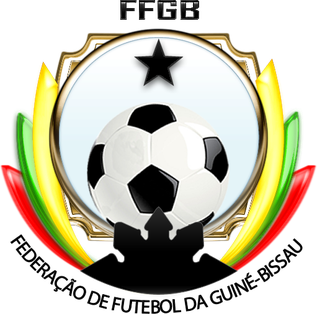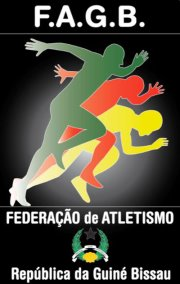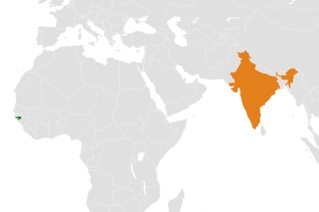
Guinea-Bissau is among the world's least developed nations and one of the 10 poorest countries in the world, and depends mainly on agriculture and fishing. Cashew crops have increased remarkably in recent years, and the country now ranks sixth in cashew production.

Bissau is the capital city of the African Republic of Guinea-Bissau. In 2015, Bissau had a population of 492,004. Bissau is located on the Geba River estuary, off the Atlantic Ocean, and is Guinea-Bissau's largest city, major port, and its administrative and military centre.

The Republic of Guinea-Bissau follows a nonaligned foreign policy and seeks friendly and cooperative relations with a wide variety of states and organizations. France, Portugal, Angola, Brazil, Egypt, Nigeria, Libya, Cuba, the Palestine Liberation Organization, and Russia have diplomatic offices in Bissau.

The Guinea-Bissau national football team is the national team of Guinea-Bissau and is controlled by the Football Federation of Guinea-Bissau. They are a member of the Confederation of African Football (CAF).

Guinea-Bissau–United States relations are bilateral relations between Guinea-Bissau and the United States.

There are diverse religions in Guinea-Bissau with no one religion having a majority. The CIA World Factbook states there are about 45% Muslims, 22% Christians, 15% Animists and 18% unspecified or other while the US State Department mentions that estimates vary greatly and cites the Pew Forum data (2010) of 40% Muslim, 31% indigenous religious practices, and 20% Christian. Sunni Islam, including that of Sufi-oriented, are most concentrated in the northern and northeastern parts of the country. Practitioners of traditional indigenous religious beliefs generally live in all but the northern parts of the country. Christians are mostly found along the coastal regions, and belong to the Roman Catholic Church and various Protestant denominations. Christians are concentrated in Bissau and other large towns.
Education in Guinea-Bissau is compulsory from the age of 7 to 13. In 1998, the gross primary enrollment rate was 53.5 percent, with higher enrollment ratio for males compared with females.

Guinea-Bissau–Russia relations is the bilateral foreign relations between the two countries, Guinea-Bissau and Russia.

The official language of Guinea-Bissau is Portuguese. Portuguese is spoken by 91% of the population. French is also learned in schools, as Guinea-Bissau is surrounded by French-speaking countries and is a full member of the Francophonie as well as the CPLP.

People's Republic of China – Guinea-Bissau relations refers to the current and historical relationship between the People's Republic of China and Guinea-Bissau. Relations were established in March 1974, several months before Guinea-Bissau's September 1974 independence. From 1990-1998, Guinea-Bissau maintained diplomatic relations with the Republic of China (Taiwan) rather than with the People's Republic. Relations were reestablished in 1998 and maintained since.

On 12 April 2012, a coup d'état in Guinea-Bissau was staged by elements of the armed forces about two weeks before the second round of a presidential election between Carlos Gomes Júnior and Kumba Ialá. The coup started in the evening with military personnel and equipment making its way onto the streets, followed by the state-owned media being taken off-air.

The Athletics Federation of Guinea-Bissau is the governing body for the sport of athletics in Guinea-Bissau. The current president is Renato Moura.

José Mário Gómes Vaz is the President of Guinea-Bissau, in office since 23 June 2014.

Guinea-Bissau–North Korea relations refers to the current and historical relationship between Guinea-Bissau and the Democratic People's Republic of Korea (DPRK), commonly known as North Korea. Neither country maintains an embassy in their respective capitals.

Corruption in Guinea-Bissau is among the highest levels in the world. In Transparency International's Corruption Perceptions Index for 2014, it was ranked 161st out of 175 countries. The previous year, it was at 163rd out of 177 countries. This marked a decline from its 2012 ranking, 150th out of 174 countries. In 2013, Guinea-Bissau scored below the averages for both Africa and West Africa on the Mo Ibrahim Foundation’s Index of African Governance.

Guinea-Bissau–India relations refers to the international relations that exist between Guinea-Bissau and India. The Embassy of India in Dakar, Senegal is concurrently accredited to Guinea-Bissau. India opened an Honorary Consulate in Bissau on 28 May 2010. Guinea-Bissau has no diplomatic mission in India.
Media of Guinea-Bissau includes print, radio, television, and the Internet. "The Conselho Nacional de Comunicação Social regulates the press." The government-run Radio Televisao de Guinea-Bissau began in 1973.
The following is a timeline of the history of the city of Bissau, Guinea-Bissau.














